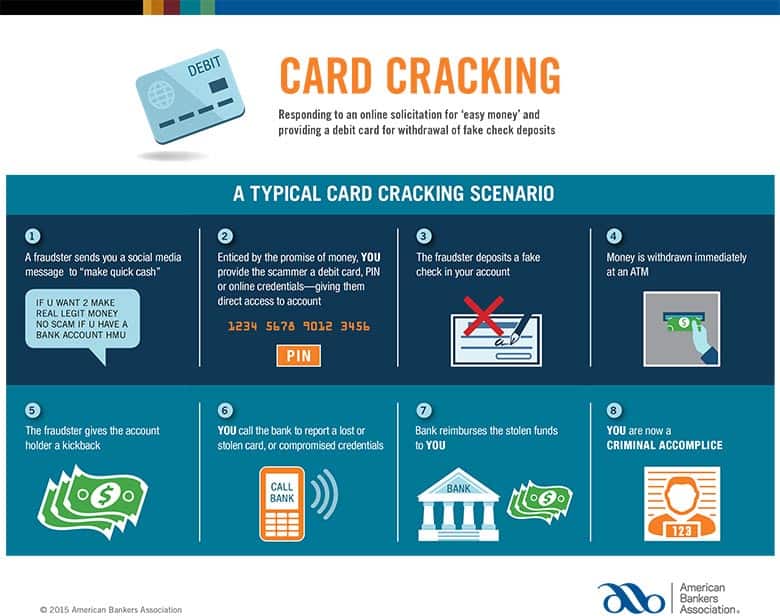In an increasingly digital world, scams and fraud have become more sophisticated. One of the deceptive tricks that is gaining traction among fraudsters is ‘Card Cracking.’ At first glance, the prospect of making a quick buck might sound tempting, but the ramifications are severe. Not only are individuals losing their hard-earned money, but they’re also inadvertently turning into accomplices in a more extensive criminal scheme.
The Allure of ‘Quick Cash’
It all begins with an innocent-looking social message. The offer sounds lucrative: make quick money without any hard work. In the age of instant gratification, it’s easy to see why many fall for it. However, behind this bait lies the card cracking trap many fail to recognize until it’s too late.
How the Card Cracking Scheme Unfolds
- Initial Contact: Through social media or messaging platforms, a fraudster initiates contact, dangling an alluring proposition of helping you earn “quick cash” with minimal effort. This is the bait, meant to catch the unsuspecting.
- Handing Over Sensitive Information: Blinded by the prospect of easy money, the individual, often without realizing the implications, hands over vital bank information. Whether it’s a debit card number, its associated PIN, or online banking credentials, this step plunges them into the heart of the scam. With this information, the fraudster gains unfettered access to your financial world.
- The Fake Check Deposit: Utilizing the provided details, the fraudster proceeds to deposit a counterfeit check into the victim’s account. Crafted meticulously, these checks often pass for genuine, sometimes even fooling the initial bank checks.
- Immediate Withdrawal: No sooner is the fake check deposited than the scammer swings into action. Prioritizing speed to avoid detection, they rapidly withdraw money, often through an ATM, ensuring their identity remains hidden.
- The Deceptive Kickback: In a bid to ensure the victim’s continued cooperation, the fraudster returns a fraction of the stolen funds as a kickback. This masterstroke not only gives victims the impression that they’ve reaped some benefits but also solidifies their trust in the scam’s legitimacy.
- Reporting to the Bank: As reality dawns and the consequences of their actions become evident, panic sets in. Faced with stolen funds and an account in disarray due to the fake check, the victim often rushes to report the incident to the bank. Claims might range from a lost or stolen card to compromised banking credentials.
- Bank Reimbursement: Aiming to uphold their commitment to customer trust, the bank typically reimburses the reported stolen funds. Unbeknownst to them, they’re inadvertently refunding money that the victim, albeit unintentionally, played a part in pilfering.
Unintended Consequences of Card Cracking: Being a Criminal Accomplice
What many victims fail to realize is that by participating in this scheme, even unknowingly, they become accomplices in a crime. Card cracking doesn’t just harm banks; it jeopardizes the individual’s reputation and might lead to criminal charges.
Protecting Yourself and Your Assets
Legacy Private Trust Company wants to emphasize the importance of safeguarding your financial information. Never share your bank details, PINs, or online credentials with anyone, no matter how promising the offer sounds in order to avoid card cracking. Be skeptical of unsolicited offers and always verify the credibility of sources before engaging in financial transactions.
In a world where digital transactions are becoming the norm, it’s crucial to be vigilant against scams like card cracking. By being informed and cautious, you can protect yourself from falling prey to such schemes and ensure that your financial legacy remains secure with Legacy Private Trust Company.
If you are a Legacy client and have questions, please do not hesitate to contact your Legacy advisor. If you are not a Legacy client and are interested in learning more about our approach to personalized wealth management, please contact us at 920.967.5020 or info@lptrust.com.
This newsletter is provided for informational purposes only.
It is not intended as legal, accounting, or financial planning advice.





